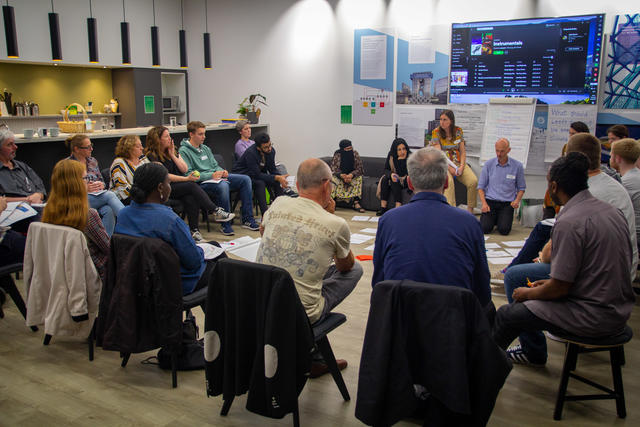Climate jury delivers verdict to city of Leeds
25th November, 2019 - 19:00

Members of the Leeds Climate Change Citizens’ Jury have announced their recommendations to the city of Leeds this evening (Monday 25 November) following almost two months of evidence gathering and deliberations.
Their recommendations include public ownership of the buses in Leeds, new green funding sources, a city-wide retrofitting programmes for houses, and a stop to the expansion of Leeds Bradford Airport.
The 21-strong jury, selected through a process of random stratified selection to represent a “mini public” of Leeds, met for nine sessions and heard from 22 commentators in order to address the question, “What should Leeds do about the emergency of climate change?”.
The Citizens’ Jury was organised and funded by Leeds Climate Commission and run by Shared Future CIC as part of the collective response to the Big Leeds Climate Conversation about the city’s transition to a zero-carbon future.
At their final session, jurors made 12 recommendations. Each juror was then asked to vote anonymously for the top seven they felt best addressed the question. These were totalled to produce the final order, ranked in terms of numbers of votes.
Recommendations
(See separate summary document on this page for the jurors’ full version)
- Top of the jury’s recommendations is a focus on transport, with a call for bus provision to be brought under public control (starting with First Bus), with 100% of jurors agreeing on this. The jurors recommend that “extensive positive action is taken to make the use of private cars a last resort for transportation” in Leeds. Among a raft of other transport-related recommendations are a congestion charge, safe cycle lanes and cycle storage, and increased pedestrianisation. Eighteen of the jurors (86%) also believed that it is the wrong decision to expand Leeds Bradford Airport (see recommendation 9).
- All existing housing must be made energy efficient.
- A large-scale communication drive through every possible means is needed with clear, positive and practical messages which emphasise the necessity for individuals, community and organisational action at all levels to tackle the climate crisis. Education in schools is central to this.
- A variety of funding sources should be explored, from an investment fund and a local government green bond to crowdfunding and investment of pension funds. Jurors stated that funding should have a positive effect on people’s behaviour and recommend a “carbon budget” for every individual.
- More locally devolved power: political groups in the Leeds and Yorkshire region should work together to ensure and enable action on climate change.
- Create more green spaces and reclaim abandoned spaces.
- All new housing must be as future-proofed as possible.
- A Leeds Green New Deal to stimulate the development of low-carbon solutions.
- Leeds Bradford Airport expansion should be stopped; specifically Leeds City Council should not approve new road-building or selling land to develop, and “Residents should block expansion and be educated about the impact on the carbon footprint”. The jury also said that flying should be discouraged by measures including a frequent-flyer tax (based on income and number of flights and location) and by advertising holidays in the UK rather than abroad.
- Pledge scheme for Leeds companies and organisations to be carbon neutral by 2030, encouraged by a “Leeds First” kitemark or badge.
- More extensive recycling facilities, which should be available and accessible to all.
- Actively discourage single-use plastics across the city with businesses and food and drink outlets having a strong role to play (eg refundable deposit cups).
All the recommendations are set out in a report published online by Leeds Climate Commission.
Accountability
The jurors added further instructions at the conclusion of the process to ensure that progress on all their recommendations is reported on. They also requested three-monthly progress reports on any ongoing projects developing from their recommendations.
As part of the follow up, they have asked for a review of any rejected ideas. The group also requested a possible repeat of the jury process, bringing in additional new recruits.
Professor Andy Gouldson, Chair of Leeds Climate Commission, said:
“Although the jury is a small sample of the public of Leeds, it is a representative sample, and the results can be relied upon to give crucial insights into the way that people in Leeds think about climate change and what we should do about it.
“As an independent voice in the city, the Leeds Climate Commission has agreed that its activities will be guided by these recommendations in the years to come, and Leeds City Council has agreed to formally respond to the recommendations.
“Some of the recommendations are undoubtedly challenging – but responding to climate change is a massive challenge, and our response has to be actively guided by the people of the city”.
Jury statement
The Leeds Climate Change Citizens’ Jury prefaced their recommendations with the following statement:
“Climate change is not someone else’s problem. It won’t go away or get better if we ignore it. We are facing a climate change emergency - immediate and urgent action is required.
“Everyone – from Leeds City Council, individuals, politicians, businesses, community groups, and other organisations - has their part to play.
“Every action counts.
“We are a diverse group, unified in our passion to resolve this issue. We have had the opportunity to challenge our own and each other’s preconceptions. We have concluded that we are at a crisis point.
“We believe our recommendations can make Leeds a better place to live as well as addressing climate change.
“We don’t have all the answers but we hope that our recommendations will go some way towards tackling the problem.
“Leeds led the world in the industrial revolution - we believe the city can now lead an environmental revolution.”
Launch event
The launch event was at The Tetley art gallery in Leeds 6.30-8.30pm Monday 25 November and was by invitation only.
Around 80 stakeholders and council members were invited to attend, including Cllr Lisa Mulherin, Executive Board member for Climate Change, Transport and Sustainable Development, who opened the event, and Cllr Neil Walshaw, Chair of Leeds City Council’s cross-party Climate Emergency Advisory Committee, who wrapped up the evening’s proceedings.
Seventeen of the jurors attended and introduced the process and presented their recommendations, along with Peter Bryant of Shared Future, and Kate Lock, Andy Gouldson and Paul Chatterton from Leeds Climate Commission.
Quotes from jurors
An evaluation exercise was held at the end of the final jury session. As part of this, jurors were asked if their opinion had changed throughout the process. Nine said yes, or that their opinion had shifted “a little”. Their responses included:
“Yes. From the start - I hadn’t realised how serious the problem was.”
“‘My views changed a little as I learned that a lot of the power lies with central government.”
“My opinion grew and grew on the seriousness of the situation more and more until now I am very annoyed.”
Those that said their opinion hadn’t changed still felt empowered by the process:
“I learned new information which gave me a better understanding of the wider problem.”
“‘I feel the same but am a lot more informed. I can make changes and I will.”
Some other participants commented as follows:
“‘Halfway through I felt task was insurmountable but the more focused theme sessions began to build up knowledge on what we could do instead of things we couldn’t.”
“…the decision to expand the airport is very disappointing as if it goes ahead the recommendations will be cancelled out.”
Background
The Leeds Climate Change Citizens’ Jury was established and funded by Leeds Climate Commission, an independent advisory group with members from key organisations and businesses in Leeds that are working together to help Leeds take action on climate change.
Leeds was the first Citizens’ Jury on climate change to take place in the UK outside of London.
The Citizens’ Jury is part of the Climate Commission’s response to the Big Leeds Climate Conversation, following Leeds City Council’s declaration of a climate emergency in March 2019 and commitment to work to make Leeds carbon neutral by 2030.
The Leeds Citizens’ Jury was tasked with producing recommendations that will be used to guide the future work of the Climate Commission and organisations across the city. The findings will also be presented to Leeds City Council’s Climate Emergency Advisory Committee, which makes formal recommendations to the council’s Executive Board.
Alongside the jury, an Oversight Panel worked to make sure that the process was fair and unbiased. The panel, made up of a diverse range of 12 stakeholders (including representatives from the City Council, Leeds Climate Commission, Chamber of Commerce, Extinction Rebellion, Youthstrike and Racial Justice Network) agreed the recruitment methodology and who the expert commentators should be.
Members of the jury were randomly selected but also chosen to make sure there was a diversity that reflected the wider population (e.g. age, geography, ethnicity, disability, attitude to climate change). Recruitment was done by the Sortition Foundation and the jury was organised by Shared Future, a community interest company that has run many similar deliberative processes.
For more background on the jury process, including the recruitment methodology, how the sessions were structured, and links to videos of the presentations by the commentators, visit the dedicated pages on the Climate Commission website.
A film of the launch event, and the report of the jurors, will be made available on the Leeds Climate Commission website: https://leedsclimate.org.uk
See this page to download the full report and summary of recommendations.


